Analysis of Entrepreneurial Ventures and Their Economic Contributions
VerifiedAdded on 2020/11/23
|16
|4781
|33
Report
AI Summary
This report provides a comprehensive analysis of entrepreneurial ventures and small business management. It begins by examining different types of entrepreneurial ventures, including social, large, and medium-sized businesses, along with various typologies such as serial and scalable ventures. The report then delves into the similarities and differences between these ventures, highlighting their contributions to job creation and economic growth. Statistical data illustrating the impact of micro and small businesses on the UK economy is presented, alongside an explanation of their significance in fostering social economic growth, particularly in the context of Brexit. The report also identifies key traits and skills of successful entrepreneurs, exploring the influence of personal background and experience on entrepreneurial motivation and mindset. Through data analysis and critical evaluation, the report offers insights into the multifaceted nature of entrepreneurship and its vital role in economic development.

ENTREPRENEURSHIP
AND
SMALL BUSINESS
MANAGEMENT
AND
SMALL BUSINESS
MANAGEMENT
Paraphrase This Document
Need a fresh take? Get an instant paraphrase of this document with our AI Paraphraser
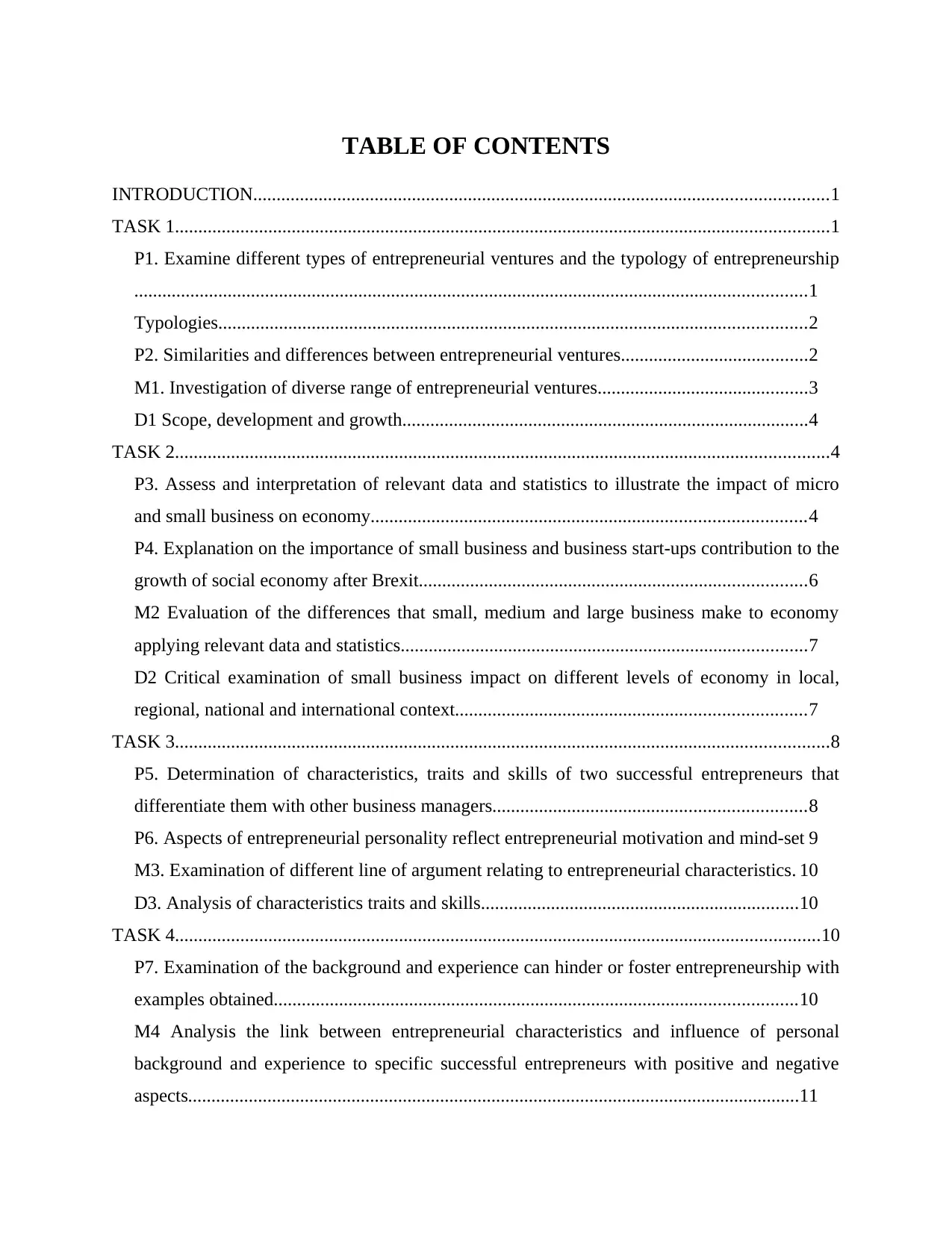
TABLE OF CONTENTS
INTRODUCTION...........................................................................................................................1
TASK 1............................................................................................................................................1
P1. Examine different types of entrepreneurial ventures and the typology of entrepreneurship
................................................................................................................................................1
Typologies..............................................................................................................................2
P2. Similarities and differences between entrepreneurial ventures........................................2
M1. Investigation of diverse range of entrepreneurial ventures.............................................3
D1 Scope, development and growth.......................................................................................4
TASK 2............................................................................................................................................4
P3. Assess and interpretation of relevant data and statistics to illustrate the impact of micro
and small business on economy.............................................................................................4
P4. Explanation on the importance of small business and business start-ups contribution to the
growth of social economy after Brexit...................................................................................6
M2 Evaluation of the differences that small, medium and large business make to economy
applying relevant data and statistics.......................................................................................7
D2 Critical examination of small business impact on different levels of economy in local,
regional, national and international context...........................................................................7
TASK 3............................................................................................................................................8
P5. Determination of characteristics, traits and skills of two successful entrepreneurs that
differentiate them with other business managers...................................................................8
P6. Aspects of entrepreneurial personality reflect entrepreneurial motivation and mind-set 9
M3. Examination of different line of argument relating to entrepreneurial characteristics. 10
D3. Analysis of characteristics traits and skills....................................................................10
TASK 4..........................................................................................................................................10
P7. Examination of the background and experience can hinder or foster entrepreneurship with
examples obtained................................................................................................................10
M4 Analysis the link between entrepreneurial characteristics and influence of personal
background and experience to specific successful entrepreneurs with positive and negative
aspects...................................................................................................................................11
INTRODUCTION...........................................................................................................................1
TASK 1............................................................................................................................................1
P1. Examine different types of entrepreneurial ventures and the typology of entrepreneurship
................................................................................................................................................1
Typologies..............................................................................................................................2
P2. Similarities and differences between entrepreneurial ventures........................................2
M1. Investigation of diverse range of entrepreneurial ventures.............................................3
D1 Scope, development and growth.......................................................................................4
TASK 2............................................................................................................................................4
P3. Assess and interpretation of relevant data and statistics to illustrate the impact of micro
and small business on economy.............................................................................................4
P4. Explanation on the importance of small business and business start-ups contribution to the
growth of social economy after Brexit...................................................................................6
M2 Evaluation of the differences that small, medium and large business make to economy
applying relevant data and statistics.......................................................................................7
D2 Critical examination of small business impact on different levels of economy in local,
regional, national and international context...........................................................................7
TASK 3............................................................................................................................................8
P5. Determination of characteristics, traits and skills of two successful entrepreneurs that
differentiate them with other business managers...................................................................8
P6. Aspects of entrepreneurial personality reflect entrepreneurial motivation and mind-set 9
M3. Examination of different line of argument relating to entrepreneurial characteristics. 10
D3. Analysis of characteristics traits and skills....................................................................10
TASK 4..........................................................................................................................................10
P7. Examination of the background and experience can hinder or foster entrepreneurship with
examples obtained................................................................................................................10
M4 Analysis the link between entrepreneurial characteristics and influence of personal
background and experience to specific successful entrepreneurs with positive and negative
aspects...................................................................................................................................11

D4 Critically evaluate personal background and experiences influencing entrepreneurs
positively and negatively......................................................................................................11
CONCLUSION..............................................................................................................................11
REFERENCES..............................................................................................................................12
positively and negatively......................................................................................................11
CONCLUSION..............................................................................................................................11
REFERENCES..............................................................................................................................12
⊘ This is a preview!⊘
Do you want full access?
Subscribe today to unlock all pages.

Trusted by 1+ million students worldwide
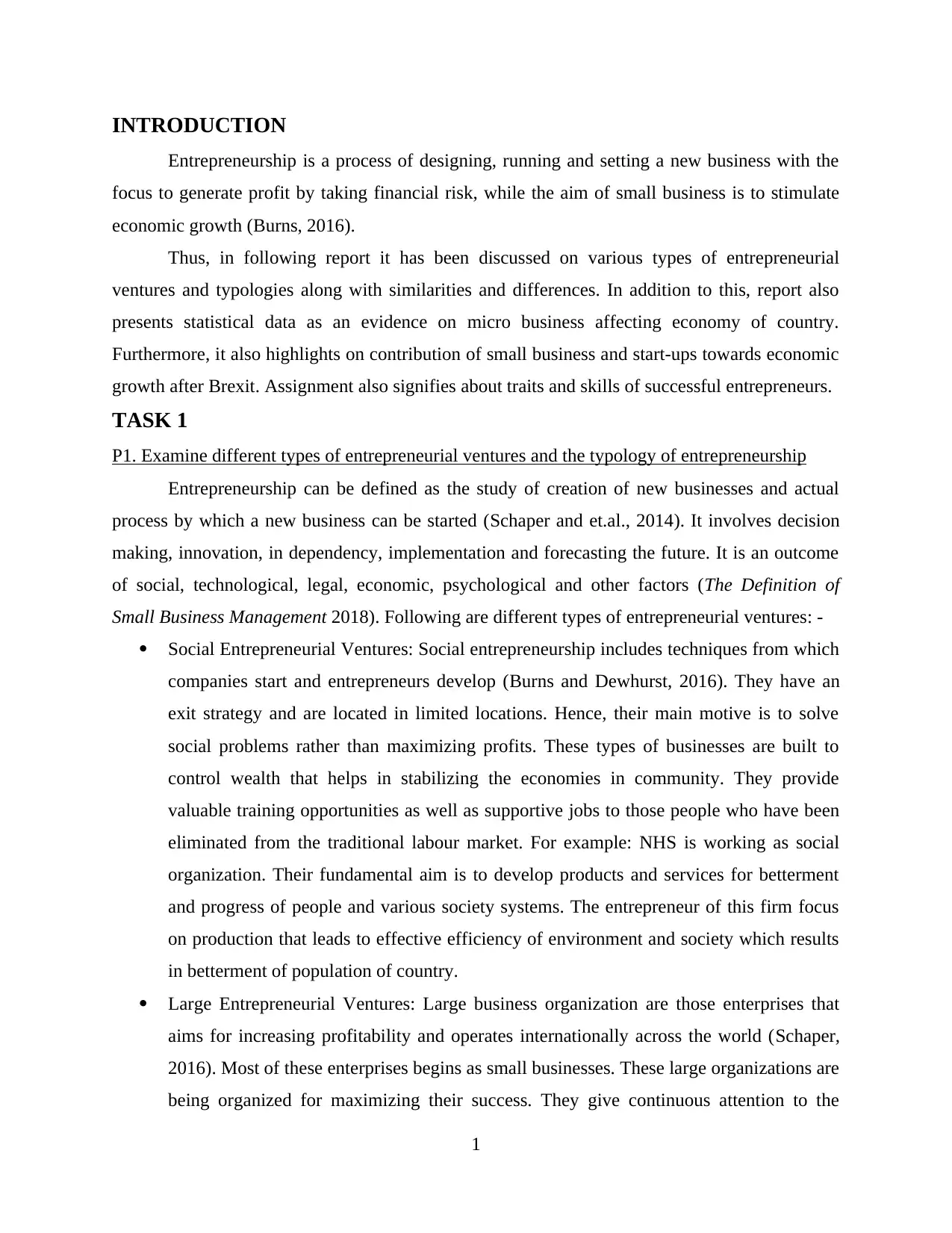
INTRODUCTION
Entrepreneurship is a process of designing, running and setting a new business with the
focus to generate profit by taking financial risk, while the aim of small business is to stimulate
economic growth (Burns, 2016).
Thus, in following report it has been discussed on various types of entrepreneurial
ventures and typologies along with similarities and differences. In addition to this, report also
presents statistical data as an evidence on micro business affecting economy of country.
Furthermore, it also highlights on contribution of small business and start-ups towards economic
growth after Brexit. Assignment also signifies about traits and skills of successful entrepreneurs.
TASK 1
P1. Examine different types of entrepreneurial ventures and the typology of entrepreneurship
Entrepreneurship can be defined as the study of creation of new businesses and actual
process by which a new business can be started (Schaper and et.al., 2014). It involves decision
making, innovation, in dependency, implementation and forecasting the future. It is an outcome
of social, technological, legal, economic, psychological and other factors (The Definition of
Small Business Management 2018). Following are different types of entrepreneurial ventures: -
Social Entrepreneurial Ventures: Social entrepreneurship includes techniques from which
companies start and entrepreneurs develop (Burns and Dewhurst, 2016). They have an
exit strategy and are located in limited locations. Hence, their main motive is to solve
social problems rather than maximizing profits. These types of businesses are built to
control wealth that helps in stabilizing the economies in community. They provide
valuable training opportunities as well as supportive jobs to those people who have been
eliminated from the traditional labour market. For example: NHS is working as social
organization. Their fundamental aim is to develop products and services for betterment
and progress of people and various society systems. The entrepreneur of this firm focus
on production that leads to effective efficiency of environment and society which results
in betterment of population of country.
Large Entrepreneurial Ventures: Large business organization are those enterprises that
aims for increasing profitability and operates internationally across the world (Schaper,
2016). Most of these enterprises begins as small businesses. These large organizations are
being organized for maximizing their success. They give continuous attention to the
1
Entrepreneurship is a process of designing, running and setting a new business with the
focus to generate profit by taking financial risk, while the aim of small business is to stimulate
economic growth (Burns, 2016).
Thus, in following report it has been discussed on various types of entrepreneurial
ventures and typologies along with similarities and differences. In addition to this, report also
presents statistical data as an evidence on micro business affecting economy of country.
Furthermore, it also highlights on contribution of small business and start-ups towards economic
growth after Brexit. Assignment also signifies about traits and skills of successful entrepreneurs.
TASK 1
P1. Examine different types of entrepreneurial ventures and the typology of entrepreneurship
Entrepreneurship can be defined as the study of creation of new businesses and actual
process by which a new business can be started (Schaper and et.al., 2014). It involves decision
making, innovation, in dependency, implementation and forecasting the future. It is an outcome
of social, technological, legal, economic, psychological and other factors (The Definition of
Small Business Management 2018). Following are different types of entrepreneurial ventures: -
Social Entrepreneurial Ventures: Social entrepreneurship includes techniques from which
companies start and entrepreneurs develop (Burns and Dewhurst, 2016). They have an
exit strategy and are located in limited locations. Hence, their main motive is to solve
social problems rather than maximizing profits. These types of businesses are built to
control wealth that helps in stabilizing the economies in community. They provide
valuable training opportunities as well as supportive jobs to those people who have been
eliminated from the traditional labour market. For example: NHS is working as social
organization. Their fundamental aim is to develop products and services for betterment
and progress of people and various society systems. The entrepreneur of this firm focus
on production that leads to effective efficiency of environment and society which results
in betterment of population of country.
Large Entrepreneurial Ventures: Large business organization are those enterprises that
aims for increasing profitability and operates internationally across the world (Schaper,
2016). Most of these enterprises begins as small businesses. These large organizations are
being organized for maximizing their success. They give continuous attention to the
1
Paraphrase This Document
Need a fresh take? Get an instant paraphrase of this document with our AI Paraphraser
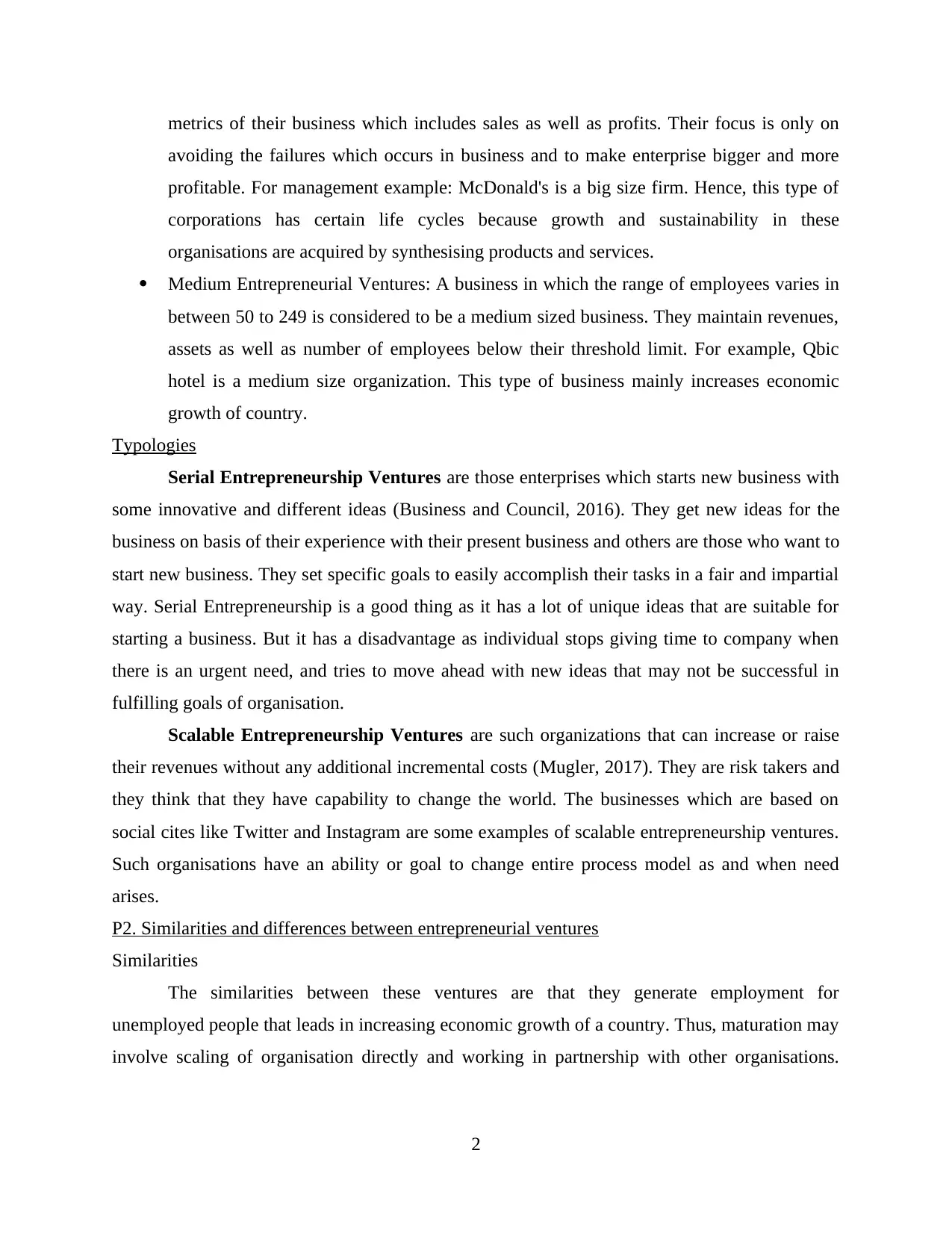
metrics of their business which includes sales as well as profits. Their focus is only on
avoiding the failures which occurs in business and to make enterprise bigger and more
profitable. For management example: McDonald's is a big size firm. Hence, this type of
corporations has certain life cycles because growth and sustainability in these
organisations are acquired by synthesising products and services.
Medium Entrepreneurial Ventures: A business in which the range of employees varies in
between 50 to 249 is considered to be a medium sized business. They maintain revenues,
assets as well as number of employees below their threshold limit. For example, Qbic
hotel is a medium size organization. This type of business mainly increases economic
growth of country.
Typologies
Serial Entrepreneurship Ventures are those enterprises which starts new business with
some innovative and different ideas (Business and Council, 2016). They get new ideas for the
business on basis of their experience with their present business and others are those who want to
start new business. They set specific goals to easily accomplish their tasks in a fair and impartial
way. Serial Entrepreneurship is a good thing as it has a lot of unique ideas that are suitable for
starting a business. But it has a disadvantage as individual stops giving time to company when
there is an urgent need, and tries to move ahead with new ideas that may not be successful in
fulfilling goals of organisation.
Scalable Entrepreneurship Ventures are such organizations that can increase or raise
their revenues without any additional incremental costs (Mugler, 2017). They are risk takers and
they think that they have capability to change the world. The businesses which are based on
social cites like Twitter and Instagram are some examples of scalable entrepreneurship ventures.
Such organisations have an ability or goal to change entire process model as and when need
arises.
P2. Similarities and differences between entrepreneurial ventures
Similarities
The similarities between these ventures are that they generate employment for
unemployed people that leads in increasing economic growth of a country. Thus, maturation may
involve scaling of organisation directly and working in partnership with other organisations.
2
avoiding the failures which occurs in business and to make enterprise bigger and more
profitable. For management example: McDonald's is a big size firm. Hence, this type of
corporations has certain life cycles because growth and sustainability in these
organisations are acquired by synthesising products and services.
Medium Entrepreneurial Ventures: A business in which the range of employees varies in
between 50 to 249 is considered to be a medium sized business. They maintain revenues,
assets as well as number of employees below their threshold limit. For example, Qbic
hotel is a medium size organization. This type of business mainly increases economic
growth of country.
Typologies
Serial Entrepreneurship Ventures are those enterprises which starts new business with
some innovative and different ideas (Business and Council, 2016). They get new ideas for the
business on basis of their experience with their present business and others are those who want to
start new business. They set specific goals to easily accomplish their tasks in a fair and impartial
way. Serial Entrepreneurship is a good thing as it has a lot of unique ideas that are suitable for
starting a business. But it has a disadvantage as individual stops giving time to company when
there is an urgent need, and tries to move ahead with new ideas that may not be successful in
fulfilling goals of organisation.
Scalable Entrepreneurship Ventures are such organizations that can increase or raise
their revenues without any additional incremental costs (Mugler, 2017). They are risk takers and
they think that they have capability to change the world. The businesses which are based on
social cites like Twitter and Instagram are some examples of scalable entrepreneurship ventures.
Such organisations have an ability or goal to change entire process model as and when need
arises.
P2. Similarities and differences between entrepreneurial ventures
Similarities
The similarities between these ventures are that they generate employment for
unemployed people that leads in increasing economic growth of a country. Thus, maturation may
involve scaling of organisation directly and working in partnership with other organisations.
2
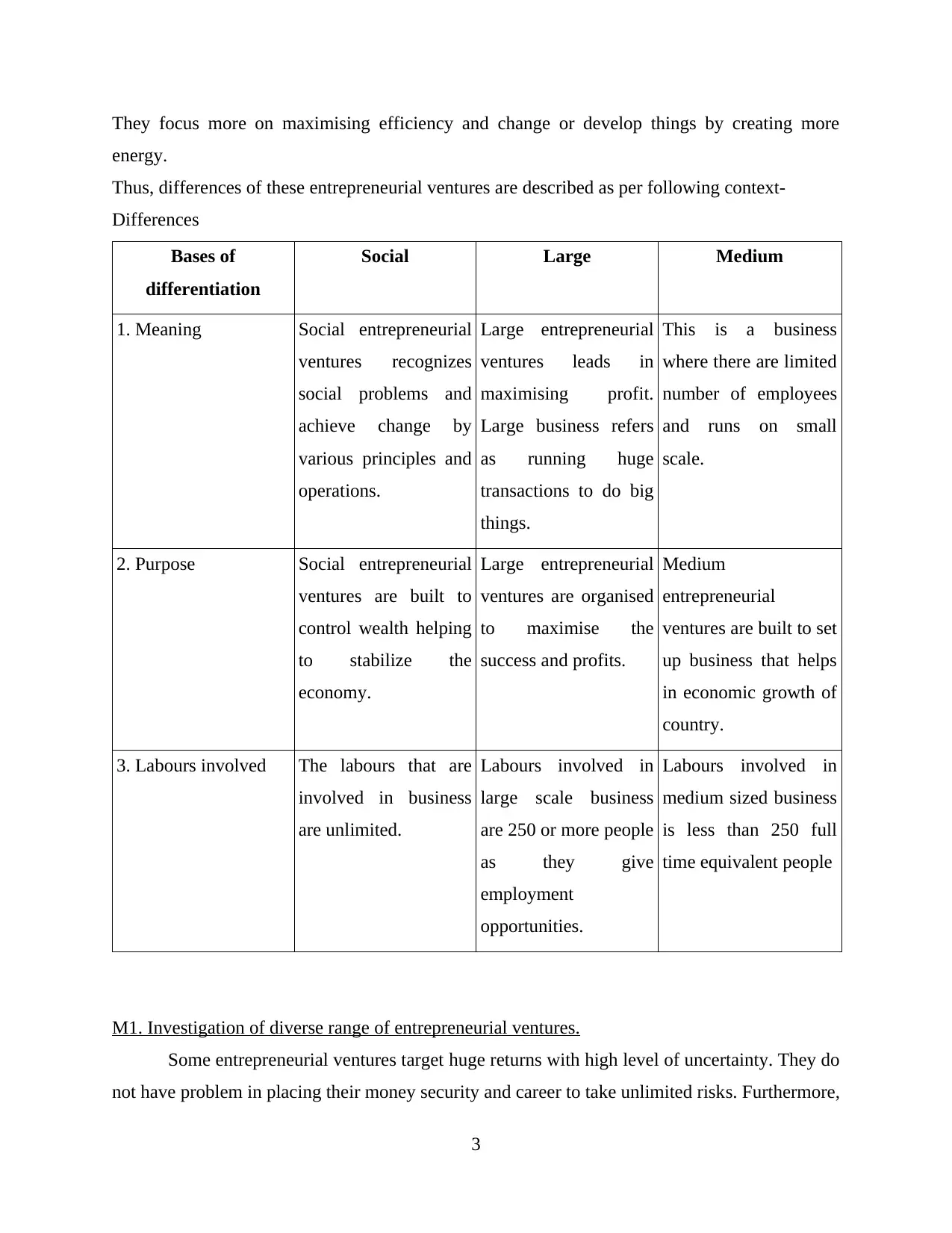
They focus more on maximising efficiency and change or develop things by creating more
energy.
Thus, differences of these entrepreneurial ventures are described as per following context-
Differences
Bases of
differentiation
Social Large Medium
1. Meaning Social entrepreneurial
ventures recognizes
social problems and
achieve change by
various principles and
operations.
Large entrepreneurial
ventures leads in
maximising profit.
Large business refers
as running huge
transactions to do big
things.
This is a business
where there are limited
number of employees
and runs on small
scale.
2. Purpose Social entrepreneurial
ventures are built to
control wealth helping
to stabilize the
economy.
Large entrepreneurial
ventures are organised
to maximise the
success and profits.
Medium
entrepreneurial
ventures are built to set
up business that helps
in economic growth of
country.
3. Labours involved The labours that are
involved in business
are unlimited.
Labours involved in
large scale business
are 250 or more people
as they give
employment
opportunities.
Labours involved in
medium sized business
is less than 250 full
time equivalent people
M1. Investigation of diverse range of entrepreneurial ventures.
Some entrepreneurial ventures target huge returns with high level of uncertainty. They do
not have problem in placing their money security and career to take unlimited risks. Furthermore,
3
energy.
Thus, differences of these entrepreneurial ventures are described as per following context-
Differences
Bases of
differentiation
Social Large Medium
1. Meaning Social entrepreneurial
ventures recognizes
social problems and
achieve change by
various principles and
operations.
Large entrepreneurial
ventures leads in
maximising profit.
Large business refers
as running huge
transactions to do big
things.
This is a business
where there are limited
number of employees
and runs on small
scale.
2. Purpose Social entrepreneurial
ventures are built to
control wealth helping
to stabilize the
economy.
Large entrepreneurial
ventures are organised
to maximise the
success and profits.
Medium
entrepreneurial
ventures are built to set
up business that helps
in economic growth of
country.
3. Labours involved The labours that are
involved in business
are unlimited.
Labours involved in
large scale business
are 250 or more people
as they give
employment
opportunities.
Labours involved in
medium sized business
is less than 250 full
time equivalent people
M1. Investigation of diverse range of entrepreneurial ventures.
Some entrepreneurial ventures target huge returns with high level of uncertainty. They do
not have problem in placing their money security and career to take unlimited risks. Furthermore,
3
⊘ This is a preview!⊘
Do you want full access?
Subscribe today to unlock all pages.

Trusted by 1+ million students worldwide
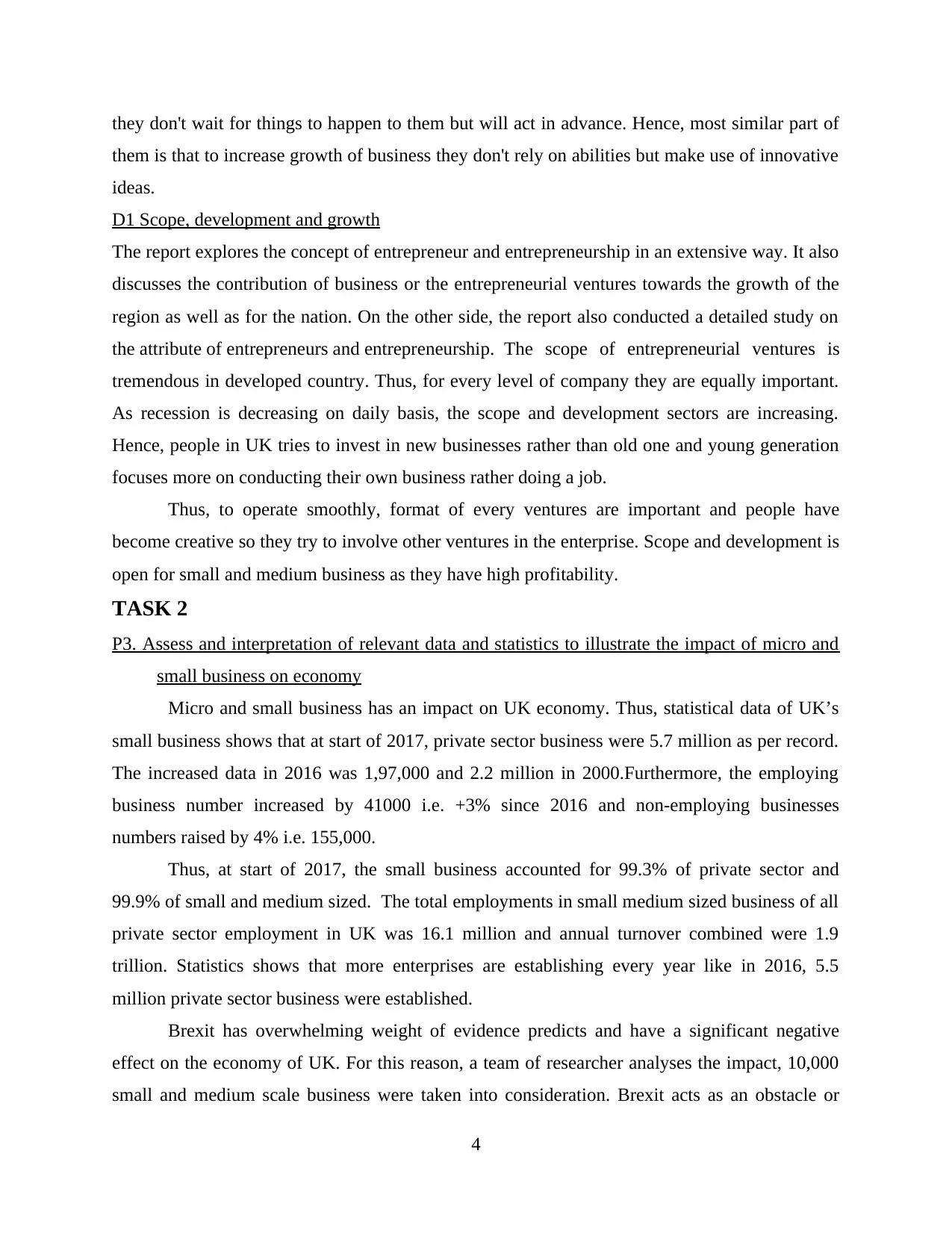
they don't wait for things to happen to them but will act in advance. Hence, most similar part of
them is that to increase growth of business they don't rely on abilities but make use of innovative
ideas.
D1 Scope, development and growth
The report explores the concept of entrepreneur and entrepreneurship in an extensive way. It also
discusses the contribution of business or the entrepreneurial ventures towards the growth of the
region as well as for the nation. On the other side, the report also conducted a detailed study on
the attribute of entrepreneurs and entrepreneurship. The scope of entrepreneurial ventures is
tremendous in developed country. Thus, for every level of company they are equally important.
As recession is decreasing on daily basis, the scope and development sectors are increasing.
Hence, people in UK tries to invest in new businesses rather than old one and young generation
focuses more on conducting their own business rather doing a job.
Thus, to operate smoothly, format of every ventures are important and people have
become creative so they try to involve other ventures in the enterprise. Scope and development is
open for small and medium business as they have high profitability.
TASK 2
P3. Assess and interpretation of relevant data and statistics to illustrate the impact of micro and
small business on economy
Micro and small business has an impact on UK economy. Thus, statistical data of UK’s
small business shows that at start of 2017, private sector business were 5.7 million as per record.
The increased data in 2016 was 1,97,000 and 2.2 million in 2000.Furthermore, the employing
business number increased by 41000 i.e. +3% since 2016 and non-employing businesses
numbers raised by 4% i.e. 155,000.
Thus, at start of 2017, the small business accounted for 99.3% of private sector and
99.9% of small and medium sized. The total employments in small medium sized business of all
private sector employment in UK was 16.1 million and annual turnover combined were 1.9
trillion. Statistics shows that more enterprises are establishing every year like in 2016, 5.5
million private sector business were established.
Brexit has overwhelming weight of evidence predicts and have a significant negative
effect on the economy of UK. For this reason, a team of researcher analyses the impact, 10,000
small and medium scale business were taken into consideration. Brexit acts as an obstacle or
4
them is that to increase growth of business they don't rely on abilities but make use of innovative
ideas.
D1 Scope, development and growth
The report explores the concept of entrepreneur and entrepreneurship in an extensive way. It also
discusses the contribution of business or the entrepreneurial ventures towards the growth of the
region as well as for the nation. On the other side, the report also conducted a detailed study on
the attribute of entrepreneurs and entrepreneurship. The scope of entrepreneurial ventures is
tremendous in developed country. Thus, for every level of company they are equally important.
As recession is decreasing on daily basis, the scope and development sectors are increasing.
Hence, people in UK tries to invest in new businesses rather than old one and young generation
focuses more on conducting their own business rather doing a job.
Thus, to operate smoothly, format of every ventures are important and people have
become creative so they try to involve other ventures in the enterprise. Scope and development is
open for small and medium business as they have high profitability.
TASK 2
P3. Assess and interpretation of relevant data and statistics to illustrate the impact of micro and
small business on economy
Micro and small business has an impact on UK economy. Thus, statistical data of UK’s
small business shows that at start of 2017, private sector business were 5.7 million as per record.
The increased data in 2016 was 1,97,000 and 2.2 million in 2000.Furthermore, the employing
business number increased by 41000 i.e. +3% since 2016 and non-employing businesses
numbers raised by 4% i.e. 155,000.
Thus, at start of 2017, the small business accounted for 99.3% of private sector and
99.9% of small and medium sized. The total employments in small medium sized business of all
private sector employment in UK was 16.1 million and annual turnover combined were 1.9
trillion. Statistics shows that more enterprises are establishing every year like in 2016, 5.5
million private sector business were established.
Brexit has overwhelming weight of evidence predicts and have a significant negative
effect on the economy of UK. For this reason, a team of researcher analyses the impact, 10,000
small and medium scale business were taken into consideration. Brexit acts as an obstacle or
4
Paraphrase This Document
Need a fresh take? Get an instant paraphrase of this document with our AI Paraphraser
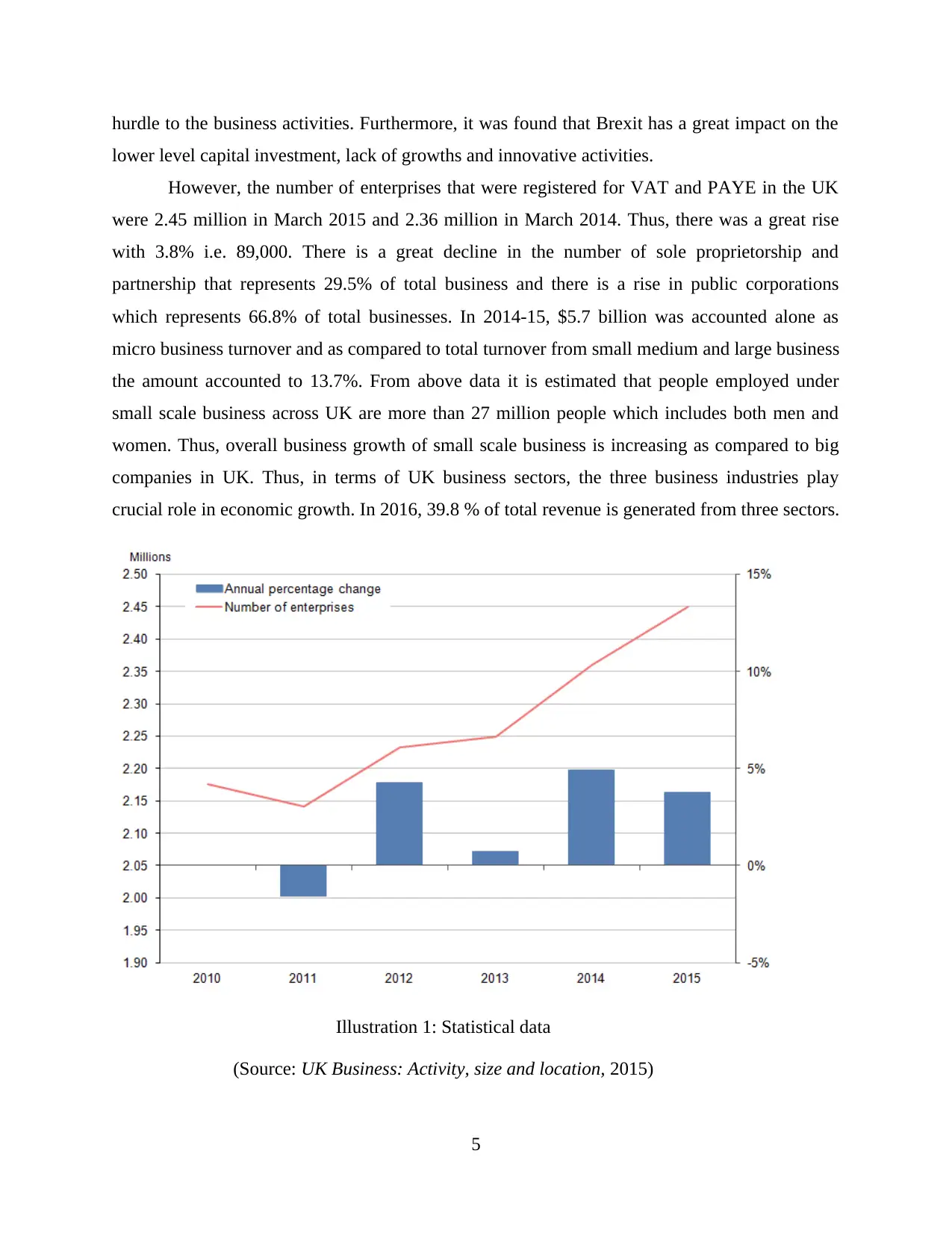
hurdle to the business activities. Furthermore, it was found that Brexit has a great impact on the
lower level capital investment, lack of growths and innovative activities.
However, the number of enterprises that were registered for VAT and PAYE in the UK
were 2.45 million in March 2015 and 2.36 million in March 2014. Thus, there was a great rise
with 3.8% i.e. 89,000. There is a great decline in the number of sole proprietorship and
partnership that represents 29.5% of total business and there is a rise in public corporations
which represents 66.8% of total businesses. In 2014-15, $5.7 billion was accounted alone as
micro business turnover and as compared to total turnover from small medium and large business
the amount accounted to 13.7%. From above data it is estimated that people employed under
small scale business across UK are more than 27 million people which includes both men and
women. Thus, overall business growth of small scale business is increasing as compared to big
companies in UK. Thus, in terms of UK business sectors, the three business industries play
crucial role in economic growth. In 2016, 39.8 % of total revenue is generated from three sectors.
Illustration 1: Statistical data
(Source: UK Business: Activity, size and location, 2015)
5
lower level capital investment, lack of growths and innovative activities.
However, the number of enterprises that were registered for VAT and PAYE in the UK
were 2.45 million in March 2015 and 2.36 million in March 2014. Thus, there was a great rise
with 3.8% i.e. 89,000. There is a great decline in the number of sole proprietorship and
partnership that represents 29.5% of total business and there is a rise in public corporations
which represents 66.8% of total businesses. In 2014-15, $5.7 billion was accounted alone as
micro business turnover and as compared to total turnover from small medium and large business
the amount accounted to 13.7%. From above data it is estimated that people employed under
small scale business across UK are more than 27 million people which includes both men and
women. Thus, overall business growth of small scale business is increasing as compared to big
companies in UK. Thus, in terms of UK business sectors, the three business industries play
crucial role in economic growth. In 2016, 39.8 % of total revenue is generated from three sectors.
Illustration 1: Statistical data
(Source: UK Business: Activity, size and location, 2015)
5
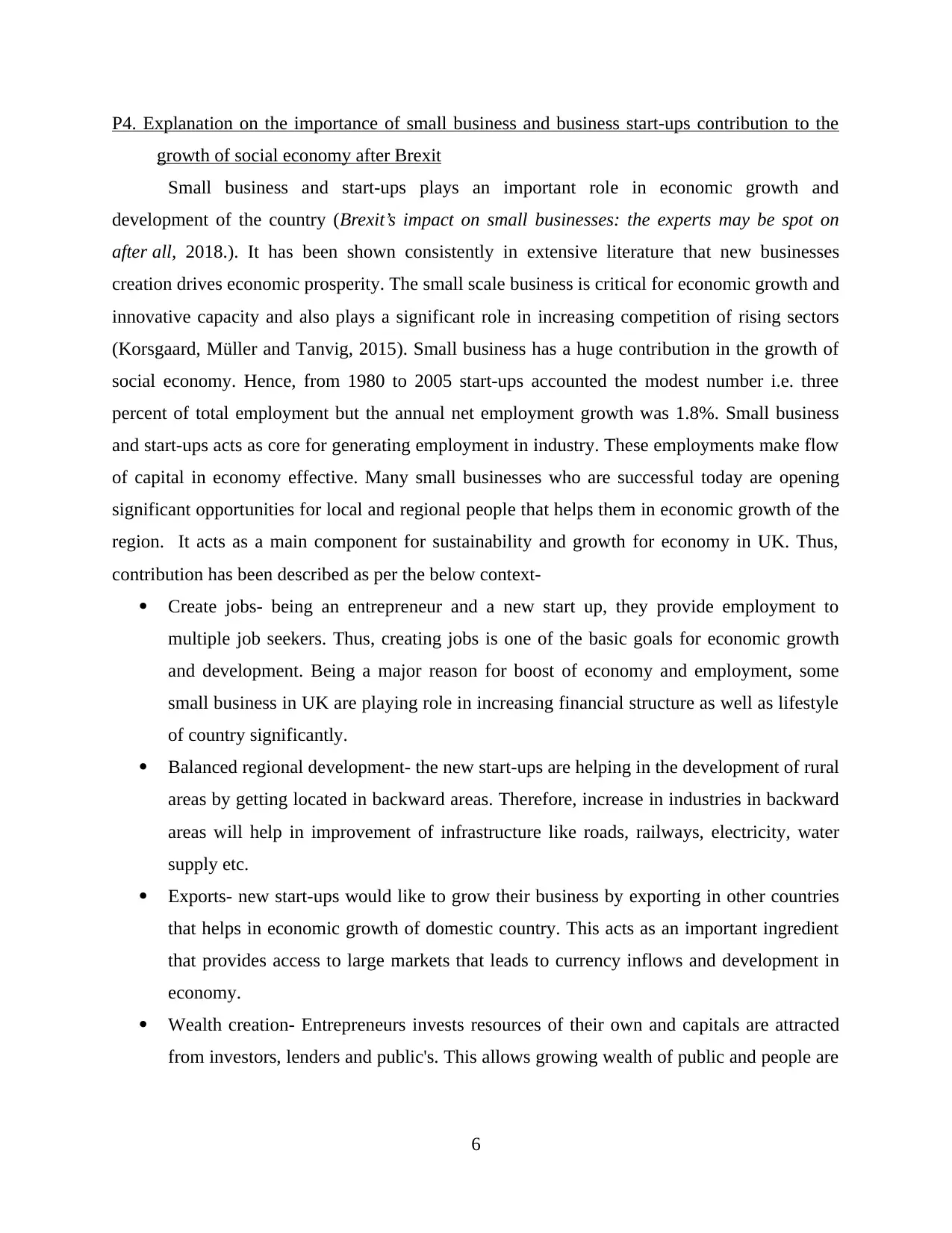
P4. Explanation on the importance of small business and business start-ups contribution to the
growth of social economy after Brexit
Small business and start-ups plays an important role in economic growth and
development of the country (Brexit’s impact on small businesses: the experts may be spot on
after all, 2018.). It has been shown consistently in extensive literature that new businesses
creation drives economic prosperity. The small scale business is critical for economic growth and
innovative capacity and also plays a significant role in increasing competition of rising sectors
(Korsgaard, Müller and Tanvig, 2015). Small business has a huge contribution in the growth of
social economy. Hence, from 1980 to 2005 start-ups accounted the modest number i.e. three
percent of total employment but the annual net employment growth was 1.8%. Small business
and start-ups acts as core for generating employment in industry. These employments make flow
of capital in economy effective. Many small businesses who are successful today are opening
significant opportunities for local and regional people that helps them in economic growth of the
region. It acts as a main component for sustainability and growth for economy in UK. Thus,
contribution has been described as per the below context-
Create jobs- being an entrepreneur and a new start up, they provide employment to
multiple job seekers. Thus, creating jobs is one of the basic goals for economic growth
and development. Being a major reason for boost of economy and employment, some
small business in UK are playing role in increasing financial structure as well as lifestyle
of country significantly.
Balanced regional development- the new start-ups are helping in the development of rural
areas by getting located in backward areas. Therefore, increase in industries in backward
areas will help in improvement of infrastructure like roads, railways, electricity, water
supply etc.
Exports- new start-ups would like to grow their business by exporting in other countries
that helps in economic growth of domestic country. This acts as an important ingredient
that provides access to large markets that leads to currency inflows and development in
economy.
Wealth creation- Entrepreneurs invests resources of their own and capitals are attracted
from investors, lenders and public's. This allows growing wealth of public and people are
6
growth of social economy after Brexit
Small business and start-ups plays an important role in economic growth and
development of the country (Brexit’s impact on small businesses: the experts may be spot on
after all, 2018.). It has been shown consistently in extensive literature that new businesses
creation drives economic prosperity. The small scale business is critical for economic growth and
innovative capacity and also plays a significant role in increasing competition of rising sectors
(Korsgaard, Müller and Tanvig, 2015). Small business has a huge contribution in the growth of
social economy. Hence, from 1980 to 2005 start-ups accounted the modest number i.e. three
percent of total employment but the annual net employment growth was 1.8%. Small business
and start-ups acts as core for generating employment in industry. These employments make flow
of capital in economy effective. Many small businesses who are successful today are opening
significant opportunities for local and regional people that helps them in economic growth of the
region. It acts as a main component for sustainability and growth for economy in UK. Thus,
contribution has been described as per the below context-
Create jobs- being an entrepreneur and a new start up, they provide employment to
multiple job seekers. Thus, creating jobs is one of the basic goals for economic growth
and development. Being a major reason for boost of economy and employment, some
small business in UK are playing role in increasing financial structure as well as lifestyle
of country significantly.
Balanced regional development- the new start-ups are helping in the development of rural
areas by getting located in backward areas. Therefore, increase in industries in backward
areas will help in improvement of infrastructure like roads, railways, electricity, water
supply etc.
Exports- new start-ups would like to grow their business by exporting in other countries
that helps in economic growth of domestic country. This acts as an important ingredient
that provides access to large markets that leads to currency inflows and development in
economy.
Wealth creation- Entrepreneurs invests resources of their own and capitals are attracted
from investors, lenders and public's. This allows growing wealth of public and people are
6
⊘ This is a preview!⊘
Do you want full access?
Subscribe today to unlock all pages.

Trusted by 1+ million students worldwide
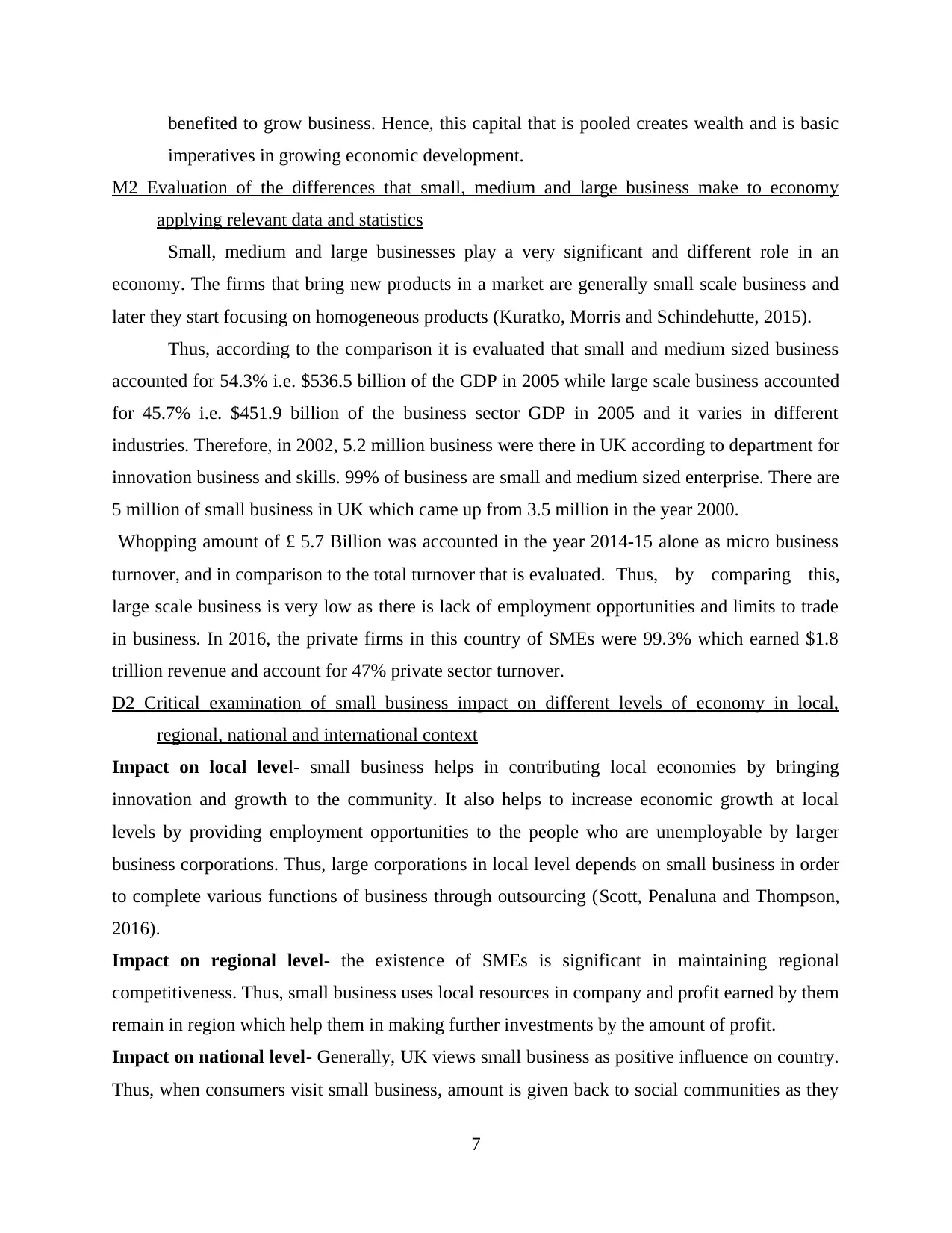
benefited to grow business. Hence, this capital that is pooled creates wealth and is basic
imperatives in growing economic development.
M2 Evaluation of the differences that small, medium and large business make to economy
applying relevant data and statistics
Small, medium and large businesses play a very significant and different role in an
economy. The firms that bring new products in a market are generally small scale business and
later they start focusing on homogeneous products (Kuratko, Morris and Schindehutte, 2015).
Thus, according to the comparison it is evaluated that small and medium sized business
accounted for 54.3% i.e. $536.5 billion of the GDP in 2005 while large scale business accounted
for 45.7% i.e. $451.9 billion of the business sector GDP in 2005 and it varies in different
industries. Therefore, in 2002, 5.2 million business were there in UK according to department for
innovation business and skills. 99% of business are small and medium sized enterprise. There are
5 million of small business in UK which came up from 3.5 million in the year 2000.
Whopping amount of £ 5.7 Billion was accounted in the year 2014-15 alone as micro business
turnover, and in comparison to the total turnover that is evaluated. Thus, by comparing this,
large scale business is very low as there is lack of employment opportunities and limits to trade
in business. In 2016, the private firms in this country of SMEs were 99.3% which earned $1.8
trillion revenue and account for 47% private sector turnover.
D2 Critical examination of small business impact on different levels of economy in local,
regional, national and international context
Impact on local level- small business helps in contributing local economies by bringing
innovation and growth to the community. It also helps to increase economic growth at local
levels by providing employment opportunities to the people who are unemployable by larger
business corporations. Thus, large corporations in local level depends on small business in order
to complete various functions of business through outsourcing (Scott, Penaluna and Thompson,
2016).
Impact on regional level- the existence of SMEs is significant in maintaining regional
competitiveness. Thus, small business uses local resources in company and profit earned by them
remain in region which help them in making further investments by the amount of profit.
Impact on national level- Generally, UK views small business as positive influence on country.
Thus, when consumers visit small business, amount is given back to social communities as they
7
imperatives in growing economic development.
M2 Evaluation of the differences that small, medium and large business make to economy
applying relevant data and statistics
Small, medium and large businesses play a very significant and different role in an
economy. The firms that bring new products in a market are generally small scale business and
later they start focusing on homogeneous products (Kuratko, Morris and Schindehutte, 2015).
Thus, according to the comparison it is evaluated that small and medium sized business
accounted for 54.3% i.e. $536.5 billion of the GDP in 2005 while large scale business accounted
for 45.7% i.e. $451.9 billion of the business sector GDP in 2005 and it varies in different
industries. Therefore, in 2002, 5.2 million business were there in UK according to department for
innovation business and skills. 99% of business are small and medium sized enterprise. There are
5 million of small business in UK which came up from 3.5 million in the year 2000.
Whopping amount of £ 5.7 Billion was accounted in the year 2014-15 alone as micro business
turnover, and in comparison to the total turnover that is evaluated. Thus, by comparing this,
large scale business is very low as there is lack of employment opportunities and limits to trade
in business. In 2016, the private firms in this country of SMEs were 99.3% which earned $1.8
trillion revenue and account for 47% private sector turnover.
D2 Critical examination of small business impact on different levels of economy in local,
regional, national and international context
Impact on local level- small business helps in contributing local economies by bringing
innovation and growth to the community. It also helps to increase economic growth at local
levels by providing employment opportunities to the people who are unemployable by larger
business corporations. Thus, large corporations in local level depends on small business in order
to complete various functions of business through outsourcing (Scott, Penaluna and Thompson,
2016).
Impact on regional level- the existence of SMEs is significant in maintaining regional
competitiveness. Thus, small business uses local resources in company and profit earned by them
remain in region which help them in making further investments by the amount of profit.
Impact on national level- Generally, UK views small business as positive influence on country.
Thus, when consumers visit small business, amount is given back to social communities as they
7
Paraphrase This Document
Need a fresh take? Get an instant paraphrase of this document with our AI Paraphraser
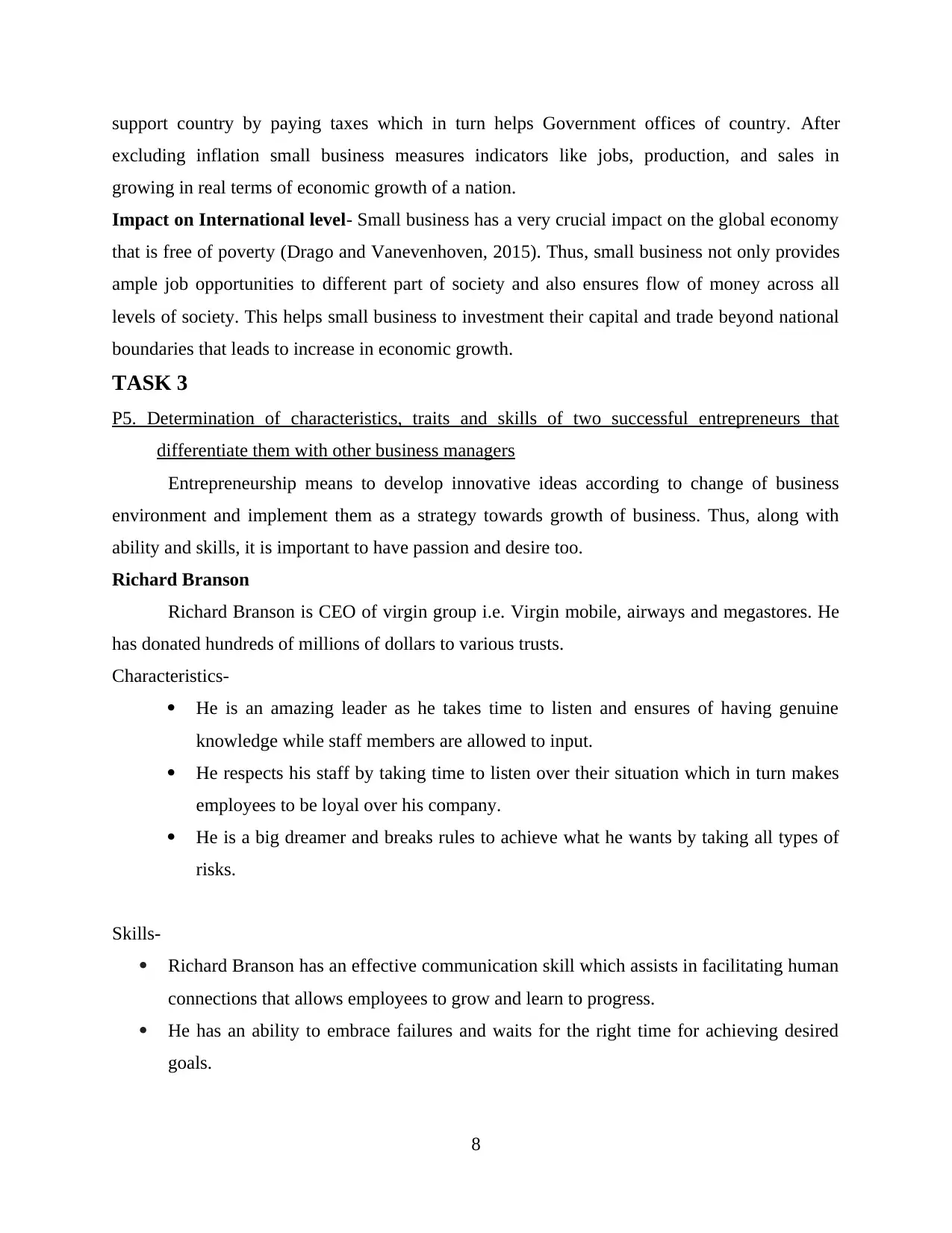
support country by paying taxes which in turn helps Government offices of country. After
excluding inflation small business measures indicators like jobs, production, and sales in
growing in real terms of economic growth of a nation.
Impact on International level- Small business has a very crucial impact on the global economy
that is free of poverty (Drago and Vanevenhoven, 2015). Thus, small business not only provides
ample job opportunities to different part of society and also ensures flow of money across all
levels of society. This helps small business to investment their capital and trade beyond national
boundaries that leads to increase in economic growth.
TASK 3
P5. Determination of characteristics, traits and skills of two successful entrepreneurs that
differentiate them with other business managers
Entrepreneurship means to develop innovative ideas according to change of business
environment and implement them as a strategy towards growth of business. Thus, along with
ability and skills, it is important to have passion and desire too.
Richard Branson
Richard Branson is CEO of virgin group i.e. Virgin mobile, airways and megastores. He
has donated hundreds of millions of dollars to various trusts.
Characteristics-
He is an amazing leader as he takes time to listen and ensures of having genuine
knowledge while staff members are allowed to input.
He respects his staff by taking time to listen over their situation which in turn makes
employees to be loyal over his company.
He is a big dreamer and breaks rules to achieve what he wants by taking all types of
risks.
Skills-
Richard Branson has an effective communication skill which assists in facilitating human
connections that allows employees to grow and learn to progress.
He has an ability to embrace failures and waits for the right time for achieving desired
goals.
8
excluding inflation small business measures indicators like jobs, production, and sales in
growing in real terms of economic growth of a nation.
Impact on International level- Small business has a very crucial impact on the global economy
that is free of poverty (Drago and Vanevenhoven, 2015). Thus, small business not only provides
ample job opportunities to different part of society and also ensures flow of money across all
levels of society. This helps small business to investment their capital and trade beyond national
boundaries that leads to increase in economic growth.
TASK 3
P5. Determination of characteristics, traits and skills of two successful entrepreneurs that
differentiate them with other business managers
Entrepreneurship means to develop innovative ideas according to change of business
environment and implement them as a strategy towards growth of business. Thus, along with
ability and skills, it is important to have passion and desire too.
Richard Branson
Richard Branson is CEO of virgin group i.e. Virgin mobile, airways and megastores. He
has donated hundreds of millions of dollars to various trusts.
Characteristics-
He is an amazing leader as he takes time to listen and ensures of having genuine
knowledge while staff members are allowed to input.
He respects his staff by taking time to listen over their situation which in turn makes
employees to be loyal over his company.
He is a big dreamer and breaks rules to achieve what he wants by taking all types of
risks.
Skills-
Richard Branson has an effective communication skill which assists in facilitating human
connections that allows employees to grow and learn to progress.
He has an ability to embrace failures and waits for the right time for achieving desired
goals.
8
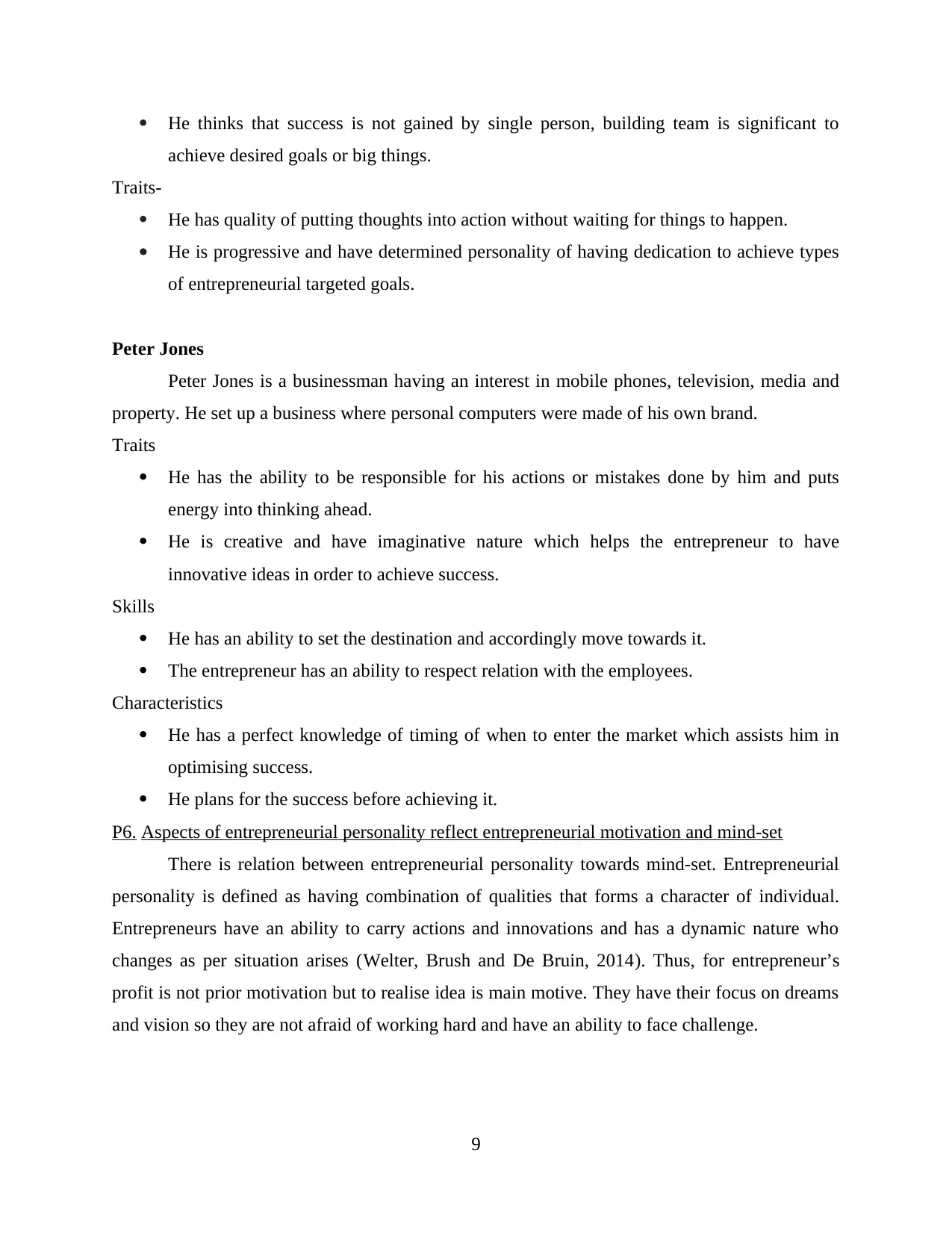
He thinks that success is not gained by single person, building team is significant to
achieve desired goals or big things.
Traits-
He has quality of putting thoughts into action without waiting for things to happen.
He is progressive and have determined personality of having dedication to achieve types
of entrepreneurial targeted goals.
Peter Jones
Peter Jones is a businessman having an interest in mobile phones, television, media and
property. He set up a business where personal computers were made of his own brand.
Traits
He has the ability to be responsible for his actions or mistakes done by him and puts
energy into thinking ahead.
He is creative and have imaginative nature which helps the entrepreneur to have
innovative ideas in order to achieve success.
Skills
He has an ability to set the destination and accordingly move towards it.
The entrepreneur has an ability to respect relation with the employees.
Characteristics
He has a perfect knowledge of timing of when to enter the market which assists him in
optimising success.
He plans for the success before achieving it.
P6. Aspects of entrepreneurial personality reflect entrepreneurial motivation and mind-set
There is relation between entrepreneurial personality towards mind-set. Entrepreneurial
personality is defined as having combination of qualities that forms a character of individual.
Entrepreneurs have an ability to carry actions and innovations and has a dynamic nature who
changes as per situation arises (Welter, Brush and De Bruin, 2014). Thus, for entrepreneur’s
profit is not prior motivation but to realise idea is main motive. They have their focus on dreams
and vision so they are not afraid of working hard and have an ability to face challenge.
9
achieve desired goals or big things.
Traits-
He has quality of putting thoughts into action without waiting for things to happen.
He is progressive and have determined personality of having dedication to achieve types
of entrepreneurial targeted goals.
Peter Jones
Peter Jones is a businessman having an interest in mobile phones, television, media and
property. He set up a business where personal computers were made of his own brand.
Traits
He has the ability to be responsible for his actions or mistakes done by him and puts
energy into thinking ahead.
He is creative and have imaginative nature which helps the entrepreneur to have
innovative ideas in order to achieve success.
Skills
He has an ability to set the destination and accordingly move towards it.
The entrepreneur has an ability to respect relation with the employees.
Characteristics
He has a perfect knowledge of timing of when to enter the market which assists him in
optimising success.
He plans for the success before achieving it.
P6. Aspects of entrepreneurial personality reflect entrepreneurial motivation and mind-set
There is relation between entrepreneurial personality towards mind-set. Entrepreneurial
personality is defined as having combination of qualities that forms a character of individual.
Entrepreneurs have an ability to carry actions and innovations and has a dynamic nature who
changes as per situation arises (Welter, Brush and De Bruin, 2014). Thus, for entrepreneur’s
profit is not prior motivation but to realise idea is main motive. They have their focus on dreams
and vision so they are not afraid of working hard and have an ability to face challenge.
9
⊘ This is a preview!⊘
Do you want full access?
Subscribe today to unlock all pages.

Trusted by 1+ million students worldwide
1 out of 16
Related Documents
Your All-in-One AI-Powered Toolkit for Academic Success.
+13062052269
info@desklib.com
Available 24*7 on WhatsApp / Email
![[object Object]](/_next/static/media/star-bottom.7253800d.svg)
Unlock your academic potential
Copyright © 2020–2026 A2Z Services. All Rights Reserved. Developed and managed by ZUCOL.




